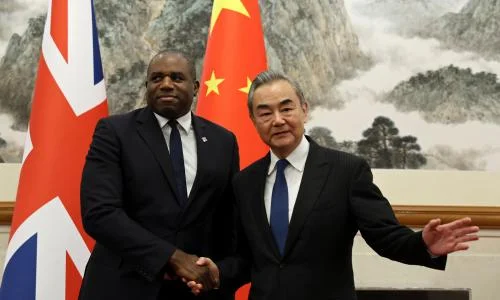October 6, 2025
China has warned of potential retaliation against the UK after London proposed legislation that would regulate foreign influence, including elements of Chinese security operations.

The United Kingdom and China are facing escalating diplomatic tensions following the UK government’s announcement of proposed legislation aimed at regulating foreign influence within British institutions. Beijing has reacted strongly, warning of potential retaliatory measures if the law is enacted, which could significantly impact diplomatic and economic relations between the two nations.
The proposed legislation, introduced by the UK Foreign Office and Home Office, seeks to enhance transparency around foreign funding and influence in the UK, particularly focusing on political lobbying, educational programs, research partnerships, and media operations. Of particular concern to China is the section of the bill that addresses the activities of foreign security apparatuses operating within UK borders, including institutions affiliated with the Chinese government.
Officials in Beijing condemned the proposals as “discriminatory and unfounded,” asserting that the UK’s actions could damage bilateral relations and destabilize trust built over decades of cooperation. The Chinese Ministry of Foreign Affairs has indicated that it may respond with reciprocal measures targeting UK businesses, research institutions, and personnel in China. Analysts suggest that potential retaliation could range from tighter visa restrictions to increased scrutiny on UK investments and trade operations in China.
UK lawmakers argue that the legislation is a necessary step to protect national security and democratic integrity. Home Secretary James Cleverly stated, “The United Kingdom must ensure that foreign states do not exert undue influence over our institutions or compromise our national security. This legislation is carefully designed to safeguard our values and democratic processes.”
Critics of the bill, however, have expressed concern that it may heighten geopolitical tensions and hinder trade and cultural exchanges. The Chinese embassy in London has already urged British businesses and universities to consider the potential risks posed by the legislation, cautioning that partnerships with Chinese organizations could be affected.
Experts highlight that the legislation mirrors similar foreign influence laws in countries like Australia, Canada, and the United States, which require registration and disclosure of foreign funding and lobbying activities. However, the inclusion of provisions targeting foreign security apparatuses has raised the stakes, as it directly challenges the operations of the Chinese Communist Party’s affiliated entities in the UK.
Economic analysts warn that any escalation could have ripple effects across trade, finance, and technology sectors. The UK imports millions of pounds worth of goods from China, and Beijing remains a key partner in research, education, and technology exchange. Any retaliatory measures could affect UK universities, tech startups, and multinational corporations, while also influencing global supply chains.
Diplomatic sources in London indicate that the government is pursuing a measured approach, emphasizing dialogue and negotiation with Chinese officials to avoid unnecessary escalation. Foreign Secretary James Cleverly has stated that the UK remains committed to constructive engagement but will not compromise on national security and transparency.
The unfolding situation underscores broader global concerns about foreign influence, cybersecurity, and the balance between international collaboration and national sovereignty. Both countries now face a delicate challenge: how to assert security priorities without triggering a diplomatic or economic crisis that could reverberate beyond Europe and East Asia.
As debates continue in the UK Parliament, political analysts note that the legislation could become a defining issue for the government’s foreign policy strategy, potentially shaping UK-China relations for years to come.